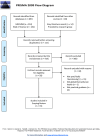Decolonising humanitarian health: A scoping review of practical guidance
- PMID: 39356652
- PMCID: PMC11446424
- DOI: 10.1371/journal.pgph.0003566
Decolonising humanitarian health: A scoping review of practical guidance
Abstract
Despite growing calls and efforts to decolonise global and humanitarian health, there is limited practical guidance for researchers, educators and practitioners on how to do so. This paper fills this gap by offering a narrative exploration of key recommendations on decolonising global/humanitarian health research, partnerships, teaching, organisational structures and other practices. We present concrete guidelines to support humanitarian actors in decolonising their work. We used a scoping review method. The search strategy was built on three overarching themes: decolonising, global health/health and humanitarian crises. We combined a MEDLINE and Web of Science database search with a grey literature search. In total, we screened abstracts and titles of 533 documents, excluding records that did not specifically refer to 'decolonising,' humanitarian and/or global health. We assessed full texts of 58 documents for eligibility, excluding documents that did not include practical recommendations. In total, 15 documents were included in this review. We identified five key themes: organisational structure, strategy and engagement; research partnerships and conceptualisations; funding for research and projects; the research lifecycle; and teaching and the curriculum. The principal finding is that humanitarian actors can decolonise their work by decentralising power, redistributing resources, critically reflecting on their work in the context of the broader socio-political landscape and recovering, centring and valuing marginalised Global South perspectives. Race was not a central analytical category in the reviewed literature, despite being an integral part of historical background narratives. Future research should reflect on practical steps towards racial justice in global/humanitarian health and be focused on ensuring that efforts towards "localisation" or "equitable partnerships" in global health are linked to decolonisation efforts, including in humanitarian health research. Our review underscores the importance of drawing on knowledge created by and for actors based in the Global South.
Copyright: © 2024 Clarke et al. This is an open access article distributed under the terms of the Creative Commons Attribution License, which permits unrestricted use, distribution, and reproduction in any medium, provided the original author and source are credited.
Conflict of interest statement
The authors have declared that no competing interests exist.
Figures
References
-
- Grosfoguel R. Decolonizing Post-Colonial Studies and Paradigms of Political-Economy: Transmodernity, Decolonial Thinking, and Global Coloniality. TRANSMODERNITY: Journal of Peripheral Cultural Production of the Luso-Hispanic World. 2011;1[1].
-
- Grosfoguel R. World-Systems Analysis in the Context of Transmodernity, Border Thinking, and Global Coloniality. Review (Fernand Braudel Center). 2006;29(2):167–87.
-
- Mignolo WD. The Darker Side of Western Modernity: Global Futures, Decolonial Options. Durham and London: Duke University Press; 2011. 2011/12/16/. 452 p.
-
- Mignolo WD. Introduction. Cultural Studies. 2007;21(2–3):155–67.
-
- Lander E. Ciencias sociales: saberes coloniales y eurocéntricos. In: Lander E, editor. La colonialidad del saber: eurocentrismo y ciencias sociales Perspectivas Latinoamericanas. Buenos Aires: Consejo Latinoamericano de Ciencias Sociales-CLACSO; UNESCO, Unidad Regional de Ciencias Sociales y Humanas para América Latina y el Caribe; 2000. p. 11–40.
Publication types
Grants and funding
LinkOut - more resources
Full Text Sources
Miscellaneous

